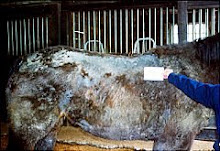—From the Times of London
Had he remained in the racing world as a trainer or thoroughbred expert after retiring from riding in 1957, Dick Francis would have been remembered as one of the most successful jockeys of his era.
Mr. Francis, who died Sunday at age 89, would also be remembered as the jockey who spectacularly managed to lose in the 1956 Grand National, Great Britain's most famous steeplechase. A photograph of him within a whisker of the finish line, aboard Queen Elizabeth's horse Devon Loch, flat on its belly with four legs helplessly splayed out, is one of racing's strangest images. To "do a Devon Loch" is a still a byword for losing a race from a seemingly unassailable position.
But the disaster actually helped launch Mr. Francis's subsequent career as a journalist and then as horse racing's most eloquent writer of thrillers. Almost all his books became international best-sellers, and they made Mr. Francis a wealthy man.
Raised in a village in Pembrokeshire in southwest Wales, Mr. Francis was the son of a horse-dealer, steeplechaser and farmer. Mr. Francis learned to ride when he was 5 and won his first race at age 8. His father felt that a day hunting or show-jumping was much more valuable to a growing boy than a day at school, and allowed Mr. Francis to drop out at age 15.
In 1939, Mr. Francis joined the Royal Air Force and was later commissioned as a pilot, flying fighters and bombers during World War II. In 1947, he married a university-educated and highly literate schoolmistress, Mary Margaret Brenchley, despite opposition from both families on the ground that they had so little in common. He arrived at their wedding with his arm in a sling, having fallen from a horse.
Mr. Francis turned professional in 1948, and was for four seasons in the 1950s Queen Elizabeth's No. 1 jockey. By the time of the Devon Loch debacle he had broken so many bones that he was advised to give up racing. His autobiography, "The Sport of Queens," was published in 1957, and Britain's Sunday Express used him as a racing correspondent for the next 16 years.
Mr. Francis approached the task of writing with little confidence. But journalism didn't pay as well as racing, and realizing that their two sons' school fees had to be paid, his wife suggested that he try a novel. Drawing on his own expertise, he wrote "Dead Cert." It was extremely well received, and, from then on, he produced a book a year.
Horses, in training or racing or being sold or put to stud, are featured in all his books. Mr. Francis's heroes tend to be lonely men, often widowed or divorced; they are frequently beaten up or injured, but they strive doggedly in their pursuit of the villains and in their personal lives, proving more resourceful and resilient than their melancholy natures permitted them to expect.
The books were set in exotic locales, from South Africa to Norway to Russia. Mary Francis explored whatever specialized fields were needed, learning to paint for "In the Frame" and about the wine trade for "Proof." "Flying Finish" involved the transport of horses, so Mrs. Francis learned to fly, an experience she enjoyed so much that she started an air-taxi service conveying people to racecourses.
Mr. Francis always acknowledged his debt to his wife, although he denied one biographer's claim that she was the primary author. After she died in 2000, he was helped by his son Felix. Mr. Francis's latest book, "Crossfire" is due to be published in August.
He would prefer, Mr. Francis sometimes said, to be remembered as a jockey rather than as a writer, but then admitted that, if that were the case, he would be remembered only as the man whose horse stopped in the Grand National.
—From the Times of London —Email remembrances@wsj.com
http://online.wsj.com/article/SB10001424052748704431404575067671970533114.html
Monday, February 15, 2010
Subscribe to:
Post Comments (Atom)

















No comments:
Post a Comment